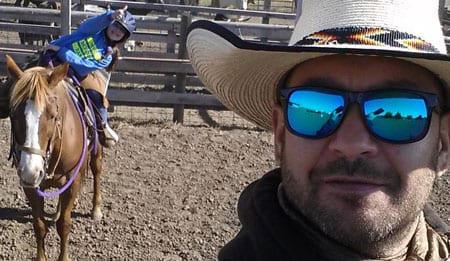
Ruben Diaz came to Washington to find a sasquatch: Squatch from the Seattle Supersonics, specifically. The man who played Squatch was a family friend who moved to the Seattle area from Ruben’s home in the rural, open land of southern New Mexico.
When Ruben was ready for a change, he followed suit. Since he had been employed as a journeyman lineworker at the Otero County Electric Coop while in the Land of Enchantment, getting a job at City Light was a natural choice when he arrived.
These days, Ruben lives in Snoqualmie on 1.5 acres–plenty of room for his horse to roam. He’s worked at City Light for eight years, and in that time he’s climbed the career ladder to his current position as overhead crew coordinator for the North Service Center.
In this week’s Seattle City (spot)light, Ruben talks about his journey to the Seattle area and his crucial job function at City Light.

Overhead Crew Coordinator Ruben Diaz (r) and Tatum (l), his daughter and cowgirl-in-training
“Me and Squatch were friends in school, and he moved up here first. My brother-in-law followed, and I came up here a couple of times to visit. My journeyman lineworker card was a ticket out of New Mexico, so I thought I’d give Washington a try.”
“Basically what I do is review every overhead job. Overhead work is just what is sounds like. It includes everything from setting poles to connecting the equipment on the poles themselves,” said Ruben.
“Any overhead job for the North service area comes to my desk. I review it for mistakes, check for materials to be available, order poles, get locations for digging and make sure permits are accurate and ready. Then I go out into the field to do a visual inspection before coordinating with supervisors to assign a crew.”
“There are three people at City Light who do the same job I do. These three desks are hubs, and during outages everything comes back to us. If crews need something, they pick up the phone and we get to their requests right away. Crews also tell us what they see—poles broken, wires on the ground, etc.—and we get that information to dispatch and keep supervisors informed. We do all of this while we’re also coordinating with crews down south.”
“I came on as a journeyman lineman, and I was on an overhead crew that did jobs with large scopes then. But it wasn’t until I got this job that I really started to see all the piece of the puzzle come together.”
“As a lineman, you get in the mode of seeing the task at hand. In my seat, you see that there’s a lot of work that goes into getting the entire crew to the point where they can accomplish a task. There’s a lot of people involved.”
“It never ceases to amaze me, what people can do when they have the tools and the resources they need to accomplish something.”